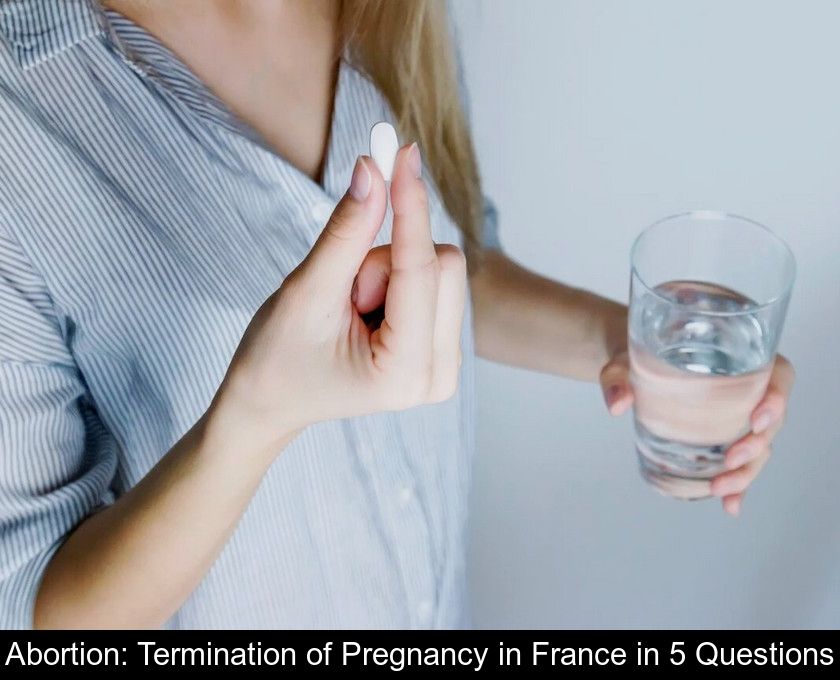Abortion: Termination Of Pregnancy In France In 5 Questions
Approximately 200,000 abortions are performed in France each year. It is estimated that nearly 40% of women will have an abortion at some point in their lives. Here is everything you need to know about voluntary termination of pregnancy in France in 5 questions.
1- What is a voluntary termination of pregnancy?
Voluntary termination of pregnancy, often referred to by the abbreviation VTP, is an abortion performed within a legal framework for non-medical reasons.
If the procedure is motivated by medical reasons (malformation or serious and incurable disease of the fetus, health risk to the mother), it is referred to as therapeutic termination of pregnancy (TTP) or medical interruption of pregnancy (MIP).
What are the methods used?
There are two methods for voluntarily terminating a pregnancy:
• the medication method.
• the surgical method.
The medication-induced abortion involves two separate doses of medication. The first one terminates the pregnancy and the second one induces contractions and the expulsion of the embryo. This method can be performed up to the end of the 5th week of pregnancy, either in a health facility (hospital or clinic) or in a local doctor's office.
The aspiration abortion consists of dilating the cervix with medication, then suctioning out the egg. This method is exclusively performed in a health facility, under local or general anesthesia. It is allowed up to the end of the 12th week of pregnancy.
Regardless of the method used, a follow-up visit must be conducted between the 14th and 21st day following the procedure. The doctor or midwife will then offer the patient an appropriate form of contraception for her situation.
Note: there is no increase in the risk of infertility, miscarriages, or ectopic pregnancies following a voluntary interruption of pregnancy.
What does French law say about abortion?
In France, abortion is legal and regulated by law since 1975. Simone Veil, who was the Minister of Health in Chirac's government under President Valéry Giscard d'Estaing, succeeded in passing the law named after her: the famous Veil Law.
According to current French legislation:
• A voluntary termination of pregnancy can be carried out before the end of the 12th week of pregnancy or the 14th week of amenorrhea.
• The woman is the sole judge of her situation and is free to make her decision: a minor girl must request this procedure herself without the presence of her parents.
• A minor must have the authorization of one of her parents (or legal guardian). However, if family dialogue is impossible, she can do without it. She must then be accompanied by an adult of her choice (an adult from her circle or a member of the family planning clinic).
• Two preliminary consultations are mandatory, with a one-week reflection period between the two. This 7-day period can be reduced if the threshold of 12 weeks of pregnancy is at risk of being exceeded.
• A psycho-social interview must be offered to any woman considering an abortion; it is mandatory for minor girls and must take place no later than 48 hours before the procedure.
Is abortion reimbursed?
Abortion has been covered by Social Security since the law of December 31, 1982. However, until now, only underage girls were covered at 100%, and other women had to pay a copayment.
At the end of October 2012, deputies voted for 100% coverage for all women. This measure came into effect in France from 2013.
Another important measure was adopted: free birth control pills for all young girls aged 15 to 18 years old. The goal is to facilitate access to contraception for all.
For more information and advice, you can contact a family planning center (see the website below).
What does the inclusion of abortion in the Constitution change?
On March 4, 2024, France became the first country in the world to explicitly enshrine in its Constitution the right of women to have access to elective abortion.
780 parliamentarians voted in favor of adding the following sentence to Article 34 of the Constitution: "The law determines the conditions under which the freedom guaranteed to women to have access to elective abortion is exercised." Only 72 parliamentarians voted against, and this historic vote was greeted with a standing ovation in the chamber.
Up until now in France, abortion was permitted by the Veil Law of 1975. But nothing ensured that this law would not be amended one day, as was the case in June 2022 with the overturning of Roe v. Wade. This ruling, which federally protected access to abortion in the United States, was outright overturned. Since then, numerous American states have significantly restricted or even banned abortion on their territory, forcing thousands of women to travel elsewhere to terminate their pregnancies.
Four days before International Women's Rights Day on March 8, the inclusion of abortion rights in the Constitution serves to better protect women in France and ensures that no one, in the future, will challenge their right to choose abortion.








